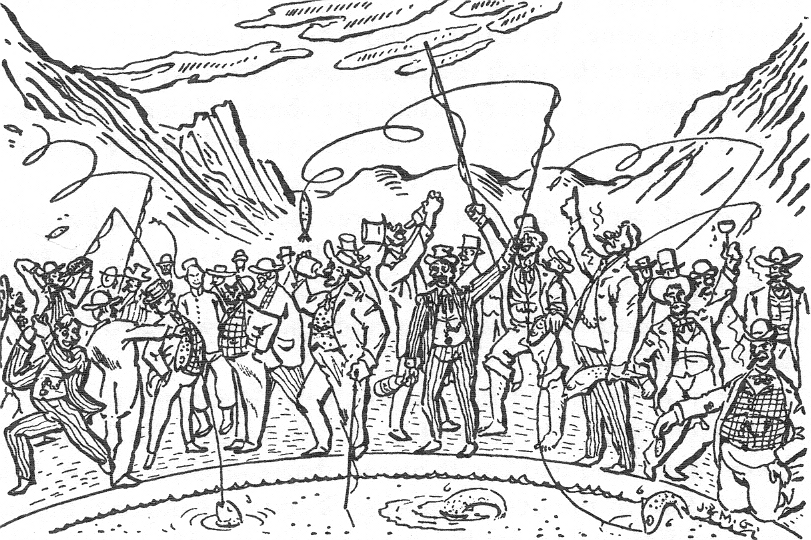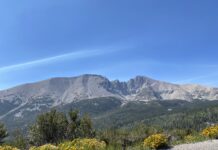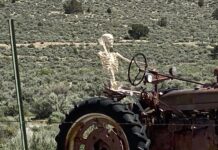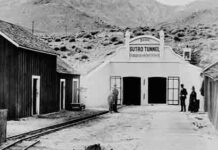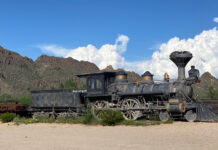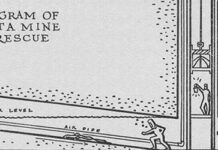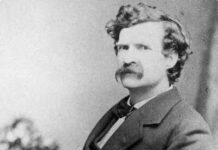Johnny Skae’s Fish Fry
by David Toll
This glimpse of the good life on the Comstock, was derived from “My Memories of the Comstock: an eye witness account of The Richest Place on Earth” by Harry Gorham, my great-grandfather. As he wrote —
I had the good fortune to know both John Skae and W.S. Hobart [both Directors of the Virginia and Gold Hill Water Company] through my uncle A.C. “Lon” Hamilton who was a particular and lifelong frend of both. Through that acquaintance I gained a friendship during the lives of both the Skae and Hobart families. . . . I cannot refrain from saying that W.S. Hobart was one of the most charming personalities I have known. He made his way from poverty —even ill health in his youth — through sheer ability. And he was an extremely handsome man.
On this particular morning I happened to meet Skae as he was on his way to the reservoir. He told me of the proposed celebration [of a supposed bonanza uncovered in his Sierra Nevada mine], of the number of prominent men who had been invited, and told me to be sure to come. If anyone questioned my presence I was to say that he, himself, had invited me. \
Delighted at being included, I went down to the “Jones Mansion” as it was called, took old “Brick Pomeroy”, one of the best horses in the stable, and drove out to the reservoir. Probably the youngest guest there, I was nineteen years old. I found a great concourse of men in every walk of life.
On the last Sunday in August about 140 years ago, the Virginia City mining speculator and capital fellow named Johnny Skae threw a party for his friends.
Johnny Skae (pronounce it sky) was a director of the Virginia City & Gold Hill Water Company, in whose Five Mile Reservoir some 15,000 New Hampshire brook trout fingerlings had been planted a year and a half before. Informed that the reservoir was thick with pan-sized brookies and encouraged by signs of imminent bonanza on the 1200 level of the Sierra Nevada Mine, Johnny invited a few hundred of his friends to a fish fry.
Johnny’s friends were the Comstock’s leading men in politics, mining, finance, commerce, law, saloonkeeping and the press, movers and shakers of the first through fourth degrees. They began to arrive at the reservoir at 10 o’clock on that gorgeous summer morning drawn along in a grand parade of gleaming rigs and trotting teams.
Johnny greeted each arriving guest with a glass of champagne, a fishing rod and a place to stand on the shore of the reservoir. By noon 30 or 40 Comstock millionaires and their accomplices were clustered on the shore within hailing distance of the bar, coats off, shirt sleeves rolled up, and thrashing the water to a froth with their lines. Dozens more surrounded the bar and mingled together along the shore. Superintendents of the Comstock’s richest mines swapped jokes with the future Governors of Nevada and Arizona. Superintendent W.H. Patton of the Ophir Mine found the rowboat kept by the water company and recruited a crew. Thus two mining superintendents, the Virginia City manager of Western Union, a leading lawyer, a Gold Hill saloonkeeper and gambler and Rollin Daggett of the Territorial Enterprise loaded the craft with champagne and launched themselves out into the little lake singing “Life on the Ocean Wave” at the tops of their lungs.
While Superintendent Patton rowed his overloaded craft in eccentric circles, old William Mooney, the Virginia city stablekeeper, hauled in a trout about the size of his finger with such force that he broke the rod, and George Roberts of San Francisco snagged a trout by the belly, lost it, and foundered in after it with a great plunging splash.
Despite these minor mishaps the fisherman made great slaughter of the fish and the champagne. Trout were yanked out of the water and flew like glittering birds over the heads of the mob. They were taken without delay to the little structure where Mr. Chadwick of the International Hotel had established himself, his boss cook with two assistants (one gutting, one frying) and two bartenders popping champagne corks and pouring whiskey. The sizzle of the pans, the pop of the corks, the triumphant yells of the fishermen — everything combined with the warm babble of conversation to create a hubbub of pure enjoyment on the brush-tufted mountainside.
A new crew took over the boat and Archie McConnell fell into the lake, and toward the middle of the afternoon Johnny Skae called in the fishing rods and opened the formalities of the day with the first speech. “Go in boys!” he cried, “and have a good time!” After the cheers subsided he added, “Let’s all take a drink!”
This effort was greeted with an even greater enthusiasm, and one after another orators held forth to cheers and applause. Frank Tritle spoke. Philip Deidesheimer spoke, and made a joke about the pond outside being a “true fisher” vein. Colonel Bob Taylor spoke and sang songs. Toasts were proposed, puns perpetrated and melodies unleashed until, as Daggett reported in the Enterprise the next day, “all distinguishable sounds were lost in the popping of the champagne corks and the attempts of everybody to speak and sing at once.”
Even in August the sun drifts early behind the summits high above the reservoir to the west. Its shadow crept across the water and down the steep soft steep slopes of the mountain, and the partiers slowly began to depart. Johnny sky poured each guest “just one more before you go,” and Captain Overton of the water company poked a cigar into each departing mouth.
The buggies and teams made another fine procession as they clattered off toward home. Hank Smith, Superintendent of the Belcher Mine in Gold Hill, lost control of his team and smashed his buggy into kindling. Captain Lord’s buggy lost a rear wheel and generally came unglued, with the gallant captain dragged 100 feet before he could bring his horses to a stop.
My great-grandfather was a guest at the party, and cherished the memory of it all his life. “All was merry as a marriage bell,” he wrote more than 60 years later. “Who can describe it? Certainly I cannot — and if I cannot, I’m sure nobody else can, for I believe I am now the only survivor of that remarkable episode.”
The fun, good fellowship and human happiness the day inspired are timeless and universal. It was a wonderful moment, and in the years since, Nevada has yet to see another party quite like Johnny Skae’s fish fry.
Johnny Skae’s Fish Fry was originally published in Nevada Magazine, June 1982. It will be included in “David Toll’s Nevada: A 50-year Tour of the Most Interesting State in America” to be published later this year.



